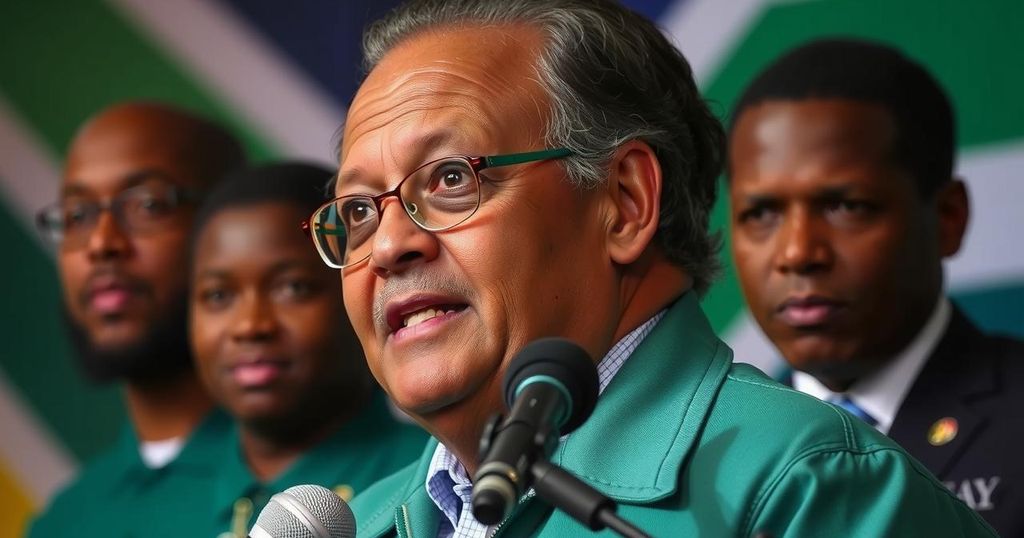SACP’s Strategic Shift: Contesting 2026 Elections Independently from ANC
The SACP has decided to contest the 2026 local elections independently, separating from the ANC due to its alliance with the DA and disappointing electoral performance. This marks a strategic shift aimed at revitalizing leftist politics amidst rising public disillusionment regarding poverty and governance. The SACP seeks to address these challenges while asserting its identity and influence within South Africa’s democratic landscape.
The South African Communist Party (SACP) has announced its decision to participate independently in the 2026 local government elections, marking a significant departure from its long-standing alliance with the African National Congress (ANC). This decision, made during the SACP’s Special National Congress in mid-December, follows the ANC’s partnership with the Democratic Alliance (DA) in a Government of National Unity (GNU) after failing to secure a majority in the recent elections. The move signifies a strategic pivot as the SACP seeks to reassert its leftist identity and address pressing social issues, including poverty and unemployment, that have been exacerbated under current governance.
The relationship between the SACP and the ANC has been strained by the governing party’s shift toward neoliberal policies, which SACP and its allies see as a betrayal of the progressive values that initially united them. The ANC’s poor electoral performance, securing only 40% of the vote, highlighted a growing public disillusionment with its governance, particularly among marginalized communities. The SACP, alongside COSATU, has voiced concern over the ANC’s direction, advocating for a renewal of their alliance with a focus on transformative social reforms and enhanced engagement with grassroots movements to restore faith in democracy.
The SACP’s independent electoral intention raises questions regarding the future dynamics of its relationship with the ANC, particularly given the overlap in membership and shared political positions within government. SACP General Secretary Solly Mapaila emphasized that while they are not severing ties completely, they aim to operate more autonomously to address the needs of the populace effectively. This decision aims to bolster the ANC’s capacity to address socio-economic challenges while asserting the SACP’s commitment to leftist ideals.
The call for a collaborative national dialogue to tackle South Africa’s crises resonates with the party’s vision, reinforced by the presence of former President Thabo Mbeki at the SACP congress. Although historically critical of Mbeki’s administration, his appeal for inclusivity signals a potential for collective action aimed at addressing systemic issues within the country. As the SACP charts its new course, it recognizes the necessity of agility and strategic thinking to navigate these turbulent political waters effectively.
The political landscape in South Africa has undergone significant shifts since the end of apartheid in 1994, predominantly influenced by the ANC’s governance. Traditionally, the SACP has been a key ally of the ANC, advocating for social justice and economic transformation. However, the ANC’s recent electoral setbacks and its decision to ally with center-right parties have prompted the SACP to reconsider its engagement, resulting in the announcement of a separate electoral strategy. This move is seen as a response to growing public frustration over poverty, unemployment, and political disillusionment within South Africa’s democracy. The SACP intends to revitalize leftist politics and reengage alienated voters by presenting a progressive alternative in the upcoming elections.
The announcement of the SACP’s independent candidacy for the 2026 local elections marks a critical juncture in South African politics, highlighting a profound rift with the ANC and the growing need for progressive representation. Amidst heightened public disenchantment with the political process, the SACP aims to reaffirm its commitment to leftist ideals and socio-economic reforms. As it embarks on this new trajectory, the party faces both challenges and opportunities in seeking to reengage a disillusioned electorate while navigating its complex relationship with the ANC and other political entities.
Original Source: cpusa.org




Post Comment